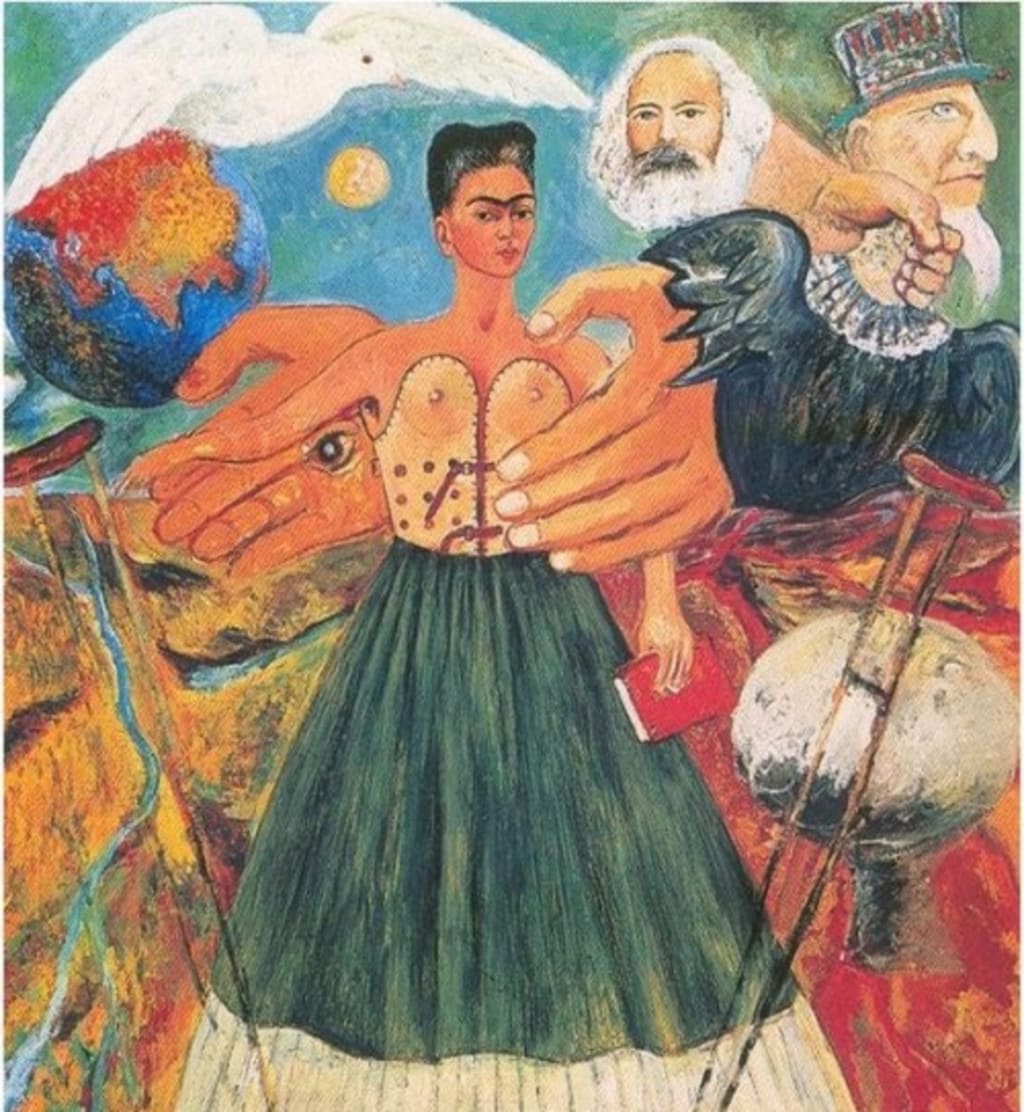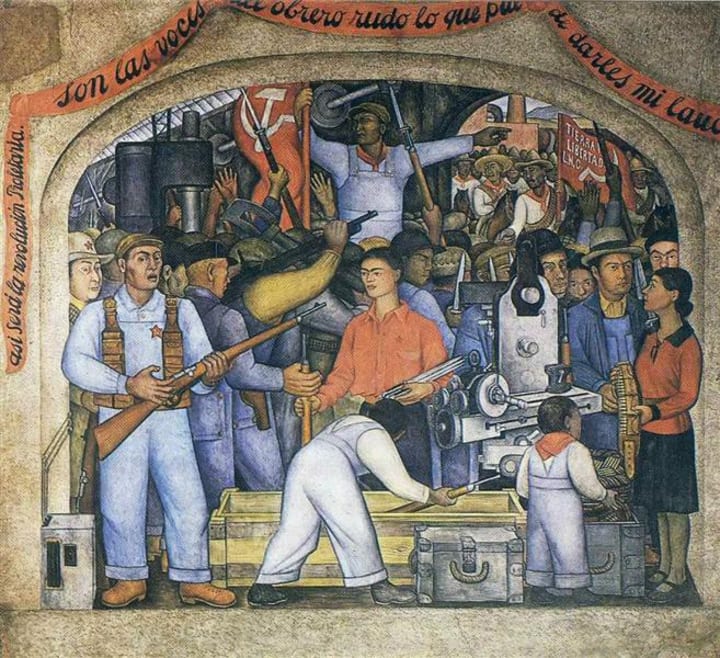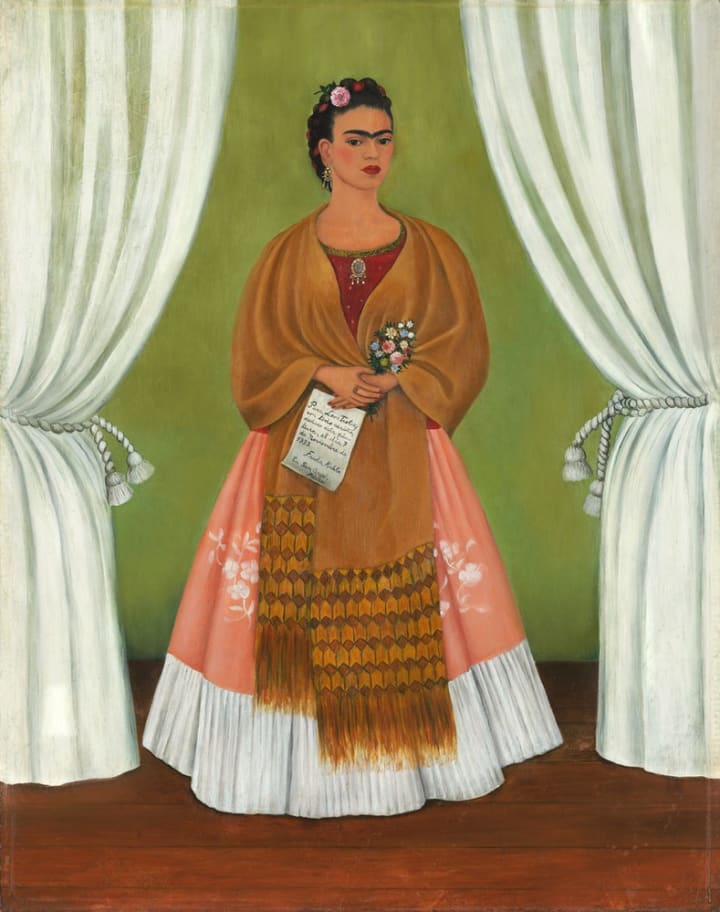How Frida Kahlo’s Affair With a Communist Revolutionary Influenced Her Art
Marxism will heal the sick

Frida Kahlo was born into an era of political upheaval, revolutionary ideas, and the age of world war. In 1910, her native country, Mexico, was plunged into the Marxist movement. As her childhood progressed, she witnessed the armed rebels fighting against the repression of peasant classes and promoting indigenous Mexican culture called "Mexicanidad."
By the time she turned twenty, she had already joined the Mexican Communist Party and that became one of the significant contributing factors to her political perspective. In addition to this, her brief affair with the exiled Russian revolutionary leader Leon Trotsky remarkably influenced her art in her later artworks.
Frida as an activist and her tumultuous relationship with her husband
Frida had a tumultuous relationship with her husband Diego Rivera. Rivera was a renowned Mexican mural artist and painter. Both of them married in 1929, got divorced in 1939, and remarried in 1940 until the untimely demise of Frida in 1954.
Frida and Rivera were members of the Mexican Communist Party and vocal supporters of Marxism. In 1928, Rivera created a mural The Arsenal, in which he portrayed Frida as an activist wearing a red-colored shirt (red being the traditional color of communism) distributing weapons to the workers. The flag bearing the communist party "hammer and sickle" glorifying in the background.

Rivera's philandering attitude damaged their relationship over the course of time and so Frida got engaged in romantic flings in the span of her short life.
Frida's brief affair with Leon Trotsky
Leon Trotsky was a Ukrainian revolutionary and politician. He was a communist but he developed a different variant of Marxism called Trotskyism.
Both Frida and Rivera became ardent followers of Trotskyism ideology. But when Joesph Stalin came into power, he expelled Trotsky from the Soviet Union in 1929. He spent the rest of his life in exile, writing and engaging in an open critique of Stalinism.
It was Rivera who convinced the Mexican President Lázaro Cárdenas to offer political asylum in Mexico. So after spending years in France, Turkey, and Norway, Trotsky and his wife boarded an oil tanker and reached Tampico, Mexico on January 9, 1937.
Frida went to greet Trotsky and his wife at the port wearing her Tehuana garb.
Kahlo and Rivera offered the Trotskys their second home, now called Casa Azul which was equipped with heavy security and personnel. Under the nose of Trotsky's wife, they had their own romantic moments.
Kahlo and Trotsky's meek attempts at discretion didn't prevent Sedova(Trotsky's wife) from discovering the affair. She gave her husband a "me-or-her ultimatum," as scholar Gerry Souter points out in her 2014 book on Rivera.
Even after their split, they were friends for quite some time.
In May 1940, fellow painter David Alfaro Siqueiros was convicted for a failed assassination attempt against Trotsky (Rivera was also the suspect). But by August 20th, Stalin's undercover agent, Ramón Mercader, killed Trotsky with an ice pack. After Trotsky's death, Rivera fled to San Francisco, and Frida was interrogated by police and spent a night in jail.
How the affair with a revolutionary and political interest influenced her art
Self-Portrait Dedicated to Leon Trotsky

On Trotsky's birthday and the anniversary of the Russian revolution, Frida gifted a mesmerizing portrait to Trotsky - Self-Portrait Dedicated to Leon Trotsky.
In this painting, she is elegantly dressed in a long embroidered skirt and fringed shawl. Her hair is adorned with flowers and coils of red yarn with subtle makeup highlights. She is poised and confident in a stage-like setting and holds a bouquet of flowers with a letter of dedication to Trotsky that states, "with all my love."
Frida's nationalistic fervor of Mexicanidad was shown in the painting too. She rejected European commodities and promoted the roots of the country's native and folk traditions. She wore the distinctive clothing of the Tehuantepec women in southwest Mexico.
The compositional elements of the stage and curtains, for example, draw upon Mexican vernacular paintings called retablos, devotional images of the Virgin or Christian saints painted on tin, which Kahlo collected.
Marxism will give health to the sick
In 1954, Frida painted Marxism will give health to the sick. As a child, she contracted polio that made her physically disable, and she met with a horrible accident during her young age. This was a portrayal of her physical suffering and her political perspective.
In this painting, she created a self-portrait in an orthopedic leather corset that encapsulates the oppression of the working class in capitalist countries like the US. Karl Marx is shown as an angelic character and his god-like hands around Frida depict how she throws her crutches; reflecting the healing properties of Marxism for society.
The painting's message seems clear: If Marxism can heal Kahlo, it can heal the world.
In this painting too, Frida wore the ethnic full gown embracing the adoption of local Mexican culture.
On July 13, 1954, when Frida died, the communist's emblem of the hammer and the sickle was draped over her casket. Frida's political beliefs definitely were reflected in her art.
About the Creator
Kamna Kirti
Art enthusiast. I engage with art at a deep level. I also share insights about entrepreneurship, founders & nascent technologies.
https://linktr.ee/kamnakirti






Comments
There are no comments for this story
Be the first to respond and start the conversation.